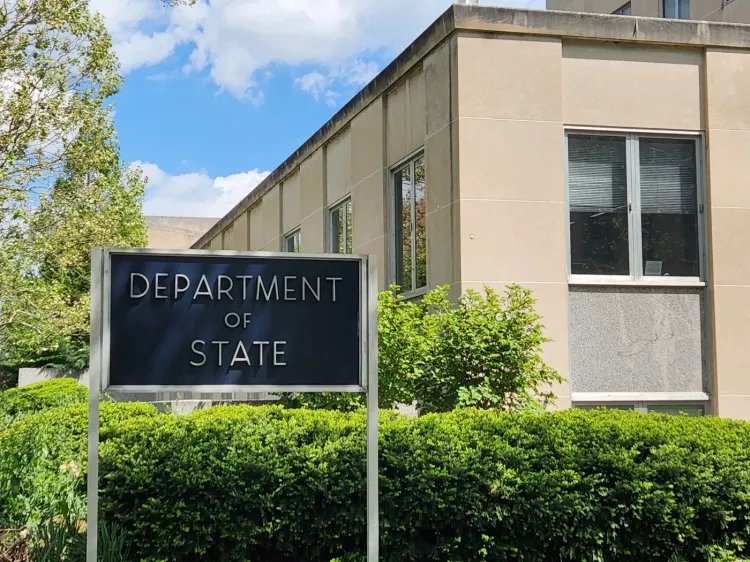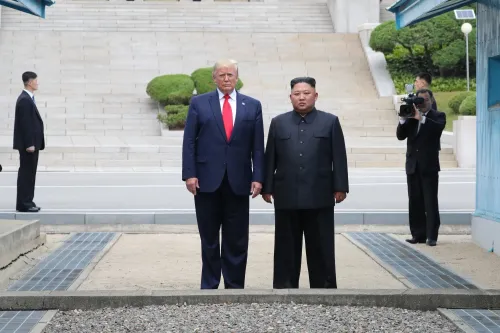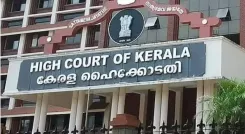What Steps is the US Taking to Disrupt North Korea's Illicit Revenue Generation?

Synopsis
Key Takeaways
- The US has announced a package of actions to disrupt North Korea's illicit revenue generation.
- Rewards of up to $15 million are offered for information leading to the arrest of key North Korean operatives.
- The measures involve various government agencies, showcasing a comprehensive strategy.
- North Korea's illicit activities include cryptocurrency theft and trafficking in counterfeit goods.
- Sanctions have been placed on the Korea Sobaeksu Trading Company and associated individuals.
Washington, July 25 (NationPress) The United States has unveiled a series of measures aimed at disrupting North Korea's illegal operations that generate funds for its nuclear and missile initiatives. These actions include offering financial rewards for North Koreans participating in these schemes, coupled with sanctions against a North Korean company and its affiliates.
This initiative is unfolding alongside indications from US President Donald Trump of a willingness to re-engage with North Korean leader Kim Jong-un, stirring speculation about a potential revival of their direct diplomatic interactions, which previously resulted in three face-to-face meetings during his first term.
The Trump administration described this effort as a comprehensive strategy, encompassing various government agencies, including the Departments of State, Justice, and Treasury.
The State Department has also stated that its Transnational Organized Crime Rewards Program is prepared to offer rewards totaling up to $15 million for information leading to the arrest or conviction of seven North Koreans—namely, Sim Hyon-sop and his six co-conspirators.
These individuals are accused of engaging in illegal activities involving the sale and purchase of tobacco from North Korea to acquire US dollars, according to the department's statement.
The reward specifics include up to $7 million for Sim, $3 million each for Myong Chol-min and Kim Se-un, and $500,000 each for Kim Yong-bok, Kim Chol-min, Ri Tong-min, and Ri Won-ho, as reported by Yonhap news agency.
Sim and several co-conspirators, including Kim Se-un, have also been implicated in illicit IT worker schemes. North Korea is believed to have deployed thousands of IT professionals abroad to orchestrate fraudulent tech work, primarily in Russia and China, according to the department.
The department underscored that North Korea's revenue generation tactics, which include cryptocurrency theft, counterfeit goods trafficking, oil smuggling, and other international criminal activities, frequently target US businesses and citizens to fund Pyongyang's weapons programs that pose a threat to the US and violate UN and US sanctions.
"Today’s actions reflect the US government's resolve to mitigate threats posed by North Korea to safeguard US companies, the financial system, and American citizens," the department stated. "The United States will not remain passive while North Korea profits from criminal actions to support its destabilizing efforts."
In a synchronized action, the Treasury Department sanctioned North Korea's Korea Sobaeksu Trading Company along with three associated individuals—Kim Se-un, Jo Kyong-hun, and Myong—for their roles in evading US and UN sanctions and clandestinely generating revenue for Pyongyang, including through IT worker schemes.
"The DPRK relies on front companies like Korea Sobaeksu Trading Company and key facilitators to procure materials and generate revenue for the regime's unlawful nuclear and ballistic missile programs," stated Bradley Smith, director of the Treasury Department's Office of Foreign Assets Control.
"Our commitment is unmistakable: Treasury, as part of a comprehensive government approach, will persist in holding accountable those who attempt to infiltrate global supply chains and facilitate sanctions evasion that supports the Kim regime's destabilizing agenda."
Alongside the Treasury and State Departments, the Justice Department unsealed indictments against seven North Koreans for what it termed the criminal evasion of sanctions under the International Emergency Economic Powers Act, linked to the illicit trafficking of counterfeit cigarettes.









